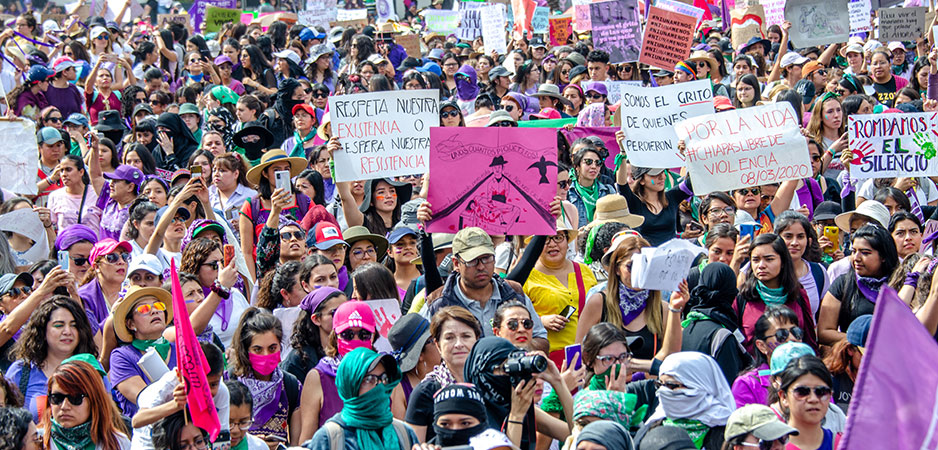Despite incidents of gender-based violence spiraling in Mexico since the introduction of COVID-19 lockdown measures in April 2020, the Mexican government slashed funding to women’s services in August as part of an emergency decree that redirected money to programs it deemed a greater priority. The defunding of women’s services is sadly not a new trend in the region. Governments in Mexico, Bolivia and Puerto Rico have all sought to cut, sometimes to zero, state support for programs and departments that work on gender initiatives. However, the chaos following in the wake of the COVID-19 pandemic has allowed governments to enact sweeping — and, if they have their way, permanent — cuts to women’s services.
Mexico’s president, Andres Manuel Lopez Obrador, leads the way in this worrying initiative. In a country where almost nine out of 10 women do not report gender violence, the scale of harm against women is alarming. Mexico was already one of the most dangerous places for women in the region, and the situation has only worsened during the pandemic. In April this year, an average of 11 women were murdered every 24 hours, while in May, Mexico’s National Shelter Network reported an 80% increase in calls for help. In June, the country reported 6,049 victims of femicide, kidnapping, and human trafficking.
Femicide Continues to Plague Mexico
Deeply disturbing are the comments President Lopez Obrador made to the press in May. When asked about the surge in domestic violence calls, Lopez Obrador retorted that “Ninety percent of those calls that you’re referring to are fake,” and in response to a question about the high number of women being murdered, he claimed this has “been manipulated a lot in the media.” Meanwhile, his government launched a misjudged public education campaign urging abusive men to “not lose patience” and “breathe and count to 10.”
In light of these flippant remarks, it is perhaps not surprising that women’s services are not deemed a top priority under the revised budget. Mexico’s 2020 federal budget to address gender violence had already been reduced by about 30%, leaving the eight states with the highest rates of femicide without any funding at all. Under the proposed 2021 budget pushed through during the chaos of COVID-19, the government will cut another 10%-20%, further decimating the country’s ability to respond to gender-based violence in an effective, respectful and targeted manner.
Cuts to social services tend to have the biggest impact on the most vulnerable populations. In this case, Lopez Obrador slashed federal funding to the Indigenous and Afro-Mexican Women Shelters (CAMIs) by 50% in 2020 and has pledged to make further cuts in the 2021 budget. CAMIs are located in poor, remote areas of Mexico and provide local women with vital support, including sexual, reproductive and maternal health care, assistance in cases of physical and sexual violence as well as translation services.
For many Indigenous and Afro-descendant Mexican women, CAMIS are the only facility where they are able to access gender-informed health care and psycho-social services. Since language and cultural barriers make it difficult for Indigenous and Afro-descendent women to file complaints about rights violations, it is even more critical that these facilities remain fully staffed and operational.
The United Nations has touted the CAMI model of delivering respectful and culturally-sensitive quality services to rural and Indigenous women and girls as a best practice for serving marginalized and hard-to-reach populations. The proposed cuts to these services prompted Dubravka Simonovic, the UN special rapporteur on violence against women, and José Francisco Cali Tzay, the UN special rapporteur on the rights of Indigenous peoples, to issue a statement urging the Mexican government to keep its international commitment to combat discrimination and violence against women and girls as well to promote equality for Indigenous groups. By defunding these programs, Mexico is at risk of reneging on its international agreements.
In addition to the UN, civil society organizations are greatly concerned about the pared down 2021 budget since the cuts to women’s services, including for domestic and gender-based violence, could not have come at a worse time.
Led by the CAMIS Network, CLADEM, CEJIL and Equality Now, a coalition of Mexican and international organizations has drafted a joint statement in response to the proposed cuts which are set to be approved by the end of this month. The organizations demand that the Mexican government prioritize funding for programs that combat gender-based violence and support survivors. Noting that 2019 was the deadliest year for women and that 2020 is on course be even worse, cutting funding would be catastrophic for Mexican women and girls, especially those from already marginalized communities.
As the pandemic ravages across the world, a shadow pandemic of violence against women has followed. While governments have prioritized combatting the former, the latter, as illustrated by the case of Mexico, has been largely allowed to go unchecked. We cannot allow women and girls, especially those from marginalized communities, to be collateral damage in the fight against the coronavirus. A gendered lens must be applied to any and all solutions, otherwise, we risk sacrificing the health, safety and dignity of millions of women around the world.
The views expressed in this article are the author’s own and do not necessarily reflect Fair Observer’s editorial policy.
Support Fair Observer
We rely on your support for our independence, diversity and quality.
For more than 10 years, Fair Observer has been free, fair and independent. No billionaire owns us, no advertisers control us. We are a reader-supported nonprofit. Unlike many other publications, we keep our content free for readers regardless of where they live or whether they can afford to pay. We have no paywalls and no ads.
In the post-truth era of fake news, echo chambers and filter bubbles, we publish a plurality of perspectives from around the world. Anyone can publish with us, but everyone goes through a rigorous editorial process. So, you get fact-checked, well-reasoned content instead of noise.
We publish 2,500+ voices from 90+ countries. We also conduct education and training programs
on subjects ranging from digital media and journalism to writing and critical thinking. This
doesn’t come cheap. Servers, editors, trainers and web developers cost
money.
Please consider supporting us on a regular basis as a recurring donor or a
sustaining member.
Will you support FO’s journalism?
We rely on your support for our independence, diversity and quality.





